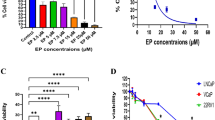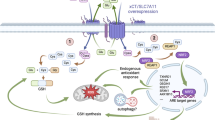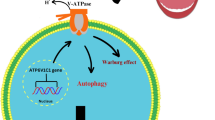Abstract
Purpose
Colorectal tumors (CRC) with microsatellite instability (MSI) show resistance to chemotherapy with 5-fluorouracil (5-FU), the most widely used pharmacological drug for CRC treatment. The aims of this study were to test the ability of quercetin (Q) and luteolin (L) to increase the sensitivity of MSI CRC cells to 5-FU and characterize the dependence of the effects on cells’ p53 status.
Methods
Two MSI human CRC-derived cell lines were used: CO115 wild type (wt) for p53 and HCT15 that harbors a p53 mutation. Apoptosis induction in these cells by 5-FU, Q and L alone, and in combinations was evaluated by TUNEL and western blot. The dependence of the effects on p53 was confirmed by small interference RNA (siRNA) in CO115 cells and in MSI HCT116 wt and p53 knockout cells.
Results
CO115 p53-wt cells are more sensitive to 5-FU than the p53-mutated HCT15. The combination treatment of 5-FU with L and Q increased apoptosis with a significant effect for Q in CO115. Both flavonoids increased p53 expression in both cell lines, an effect particularly remarkable for Q. The significant apoptotic enhancement in CO115 incubated with Q plus 5-FU involved the activation of the apoptotic mitochondrial pathway. Importantly, knockdown of p53 by siRNA in CO115 cells and p53 knockout in HCT116 cells totally abrogated apoptosis induction, demonstrating the dependence of the effect on p53 modulation by Q.
Conclusion
This study suggests the potential applicability of these phytochemicals for enhancement 5-FU efficiency in MSI CRC therapy, especially Q in p53 wt tumors.






Similar content being viewed by others
References
Rupnarain C, Dlamini Z, Naicker S, Bhoola K (2004) Colon cancer: genomics and apoptotic events. Biol Chem 385:449–464
Ribic CM, Sargent DJ, Moore MJ, Thibodeau SN, French AJ, Goldberg RM, Hamilton SR, Laurent-Puig P, Gryfe R, Shepherd LE, Tu D, Redston M, Gallinger S (2003) Tumor microsatellite-instability status as a predictor of benefit from fluorouracil-based adjuvant chemotherapy for colon cancer. N Engl J Med 349:247–257
Bhushan S, McLeod H, Walko CM (2009) Role of pharmacogenetics as predictive biomarkers of response and/or toxicity in the treatment of colorectal cancer. Clin Colorectal Cancer 8:15–21
Mader RM, Muller M, Steger GG (1998) Resistance to 5-fluorouracil. Gen Pharmacol 31:661–666
Huerta S, Goulet EJ, Livingston EH (2006) Colon cancer and apoptosis. Am J Surg 191:517–526
Davies JM, Goldberg RM (2008) First-line therapeutic strategies in metastatic colorectal cancer. Oncology (Williston Park) 22:1470–1479
Jover R, Zapater P, Castells A, Llor X, Andreu M, Cubiella J, Pinol V, Xicola RM, Bujanda L, Rene JM, Clofent J, Bessa X, Morillas JD, Nicolas-Perez D, Paya A, Alenda C (2006) Mismatch repair status in the prediction of benefit from adjuvant fluorouracil chemotherapy in colorectal cancer. Gut 55:848–855
Warusavitarne J, Schnitzler M (2007) The role of chemotherapy in microsatellite unstable (MSI-H) colorectal cancer. Int J Colorectal Dis 22:739–748
Soreide K, Janssen EA, Soiland H, Korner H, Baak JP (2006) Microsatellite instability in colorectal cancer. Br J Surg 93:395–406
Sinicrope FA, Sargent DJ (2009) Clinical implications of microsatellite instability in sporadic colon cancers. Curr Opin Oncol 21:369–373
Seruca R, Velho S, Oliveira C, Leite M, Matos P, Jordan P (2009) Unmasking the role of KRAS and BRAF pathways in MSI colorectal tumors. Expert Rev Gastroenterol Hepatol 3:5–9
Benhattar J, Cerottini JP, Saraga E, Metthez G, Givel JC (1996) p53 mutations as a possible predictor of response to chemotherapy in metastatic colorectal carcinomas. Int J Cancer 69:190–192
Violette S, Poulain L, Dussaulx E, Pepin D, Faussat AM, Chambaz J, Lacorte JM, Staedel C, Lesuffleur T (2002) Resistance of colon cancer cells to long-term 5-fluorouracil exposure is correlated to the relative level of Bcl-2 and Bcl-X(L) in addition to Bax and p53 status. Int J Cancer 98:498–504
Bunz F, Hwang PM, Torrance C, Waldman T, Zhang Y, Dillehay L, Williams J, Lengauer C, Kinzler KW, Vogelstein B (1999) Disruption of p53 in human cancer cells alters the responses to therapeutic agents. J Clin Invest 104:263–269
Adamsen BL, Kravik KL, Clausen OP, De Angelis PM (2007) Apoptosis, cell cycle progression and gene expression in TP53-depleted HCT116 colon cancer cells in response to short-term 5-fluorouracil treatment. Int J Oncol 31:1491–1500
Mori S, Ogata Y, Shirouzu K (2004) Biological features of sporadic colorectal carcinoma with high-frequency microsatellite instability: special reference to tumor proliferation and apoptosis. Int J Clin Oncol 9:322–329
Hector S, Prehn JH (2009) Apoptosis signaling proteins as prognostic biomarkers in colorectal cancer: A review. Biochim Biophys Acta 1795:117–129
Aggarwal BB, Shishodia S (2006) Molecular targets of dietary agents for prevention and therapy of cancer. Biochem Pharmacol 71:1397–1421
Ramos S (2008) Cancer chemoprevention and chemotherapy: dietary polyphenols and signalling pathways. Mol Nutr Food Res 52:507–526
Subapriya Rajamanickam RA (2008) Natural products and colon cancer: current status and future prospects. Drug Dev Res 69:460–471
Wagner EF, Nebreda AR (2009) Signal integration by JNK and p38 MAPK pathways in cancer development. Nat Rev Cancer 9:537–549
Liu J, Lin A (2005) Role of JNK activation in apoptosis: a double-edged sword. Cell Res 15:36–42
Coulthard LR, White DE, Jones DL, McDermott MF, Burchill SA (2009) p38(MAPK): stress responses from molecular mechanisms to therapeutics. Trends Mol Med 15:369–379
Xavier CP, Lima CF, Preto A, Seruca R, Fernandes-Ferreira M, Pereira-Wilson C (2009) Luteolin, quercetin and ursolic acid are potent inhibitors of proliferation and inducers of apoptosis in both KRAS and BRAF mutated human colorectal cancer cells. Cancer Lett 281:162–170
Gayet J, Zhou XP, Duval A, Rolland S, Hoang JM, Cottu P, Hamelin R (2001) Extensive characterization of genetic alterations in a series of human colorectal cancer cell lines. Oncogene 20:5025–5032
Barbour KW, Berger FG (2008) Cell death in response to antimetabolites directed at thymidylate synthase. Cancer Chemother Pharmacol 61:189–201
Bunz F, Dutriaux A, Lengauer C, Waldman T, Zhou S, Brown JP, Sedivy JM, Kinzler KW, Vogelstein B (1998) Requirement for p53 and p21 to sustain G2 arrest after DNA damage. Science 282:1497–1501
Preto A, Figueiredo J, Velho S, Ribeiro A, Soares P, Oliveira C, Seruca R (2008) BRAF provides proliferation and survival signals in MSI colorectal carcinoma cells displaying BRAF(V600E) but not KRAS mutations. J Pathol 214:320–327
Itoh N, Semba S, Ito M, Takeda H, Kawata S, Yamakawa M (2002) Phosphorylation of Akt/PKB is required for suppression of cancer cell apoptosis and tumor progression in human colorectal carcinoma. Cancer 94:3127–3134
Osaki M, Oshimura M, Ito H (2004) PI3K-Akt pathway: its functions and alterations in human cancer. Apoptosis 9:667–676
Rychahou PG, Jackson LN, Silva SR, Rajaraman S, Evers BM (2006) Targeted molecular therapy of the PI3K pathway: therapeutic significance of PI3K subunit targeting in colorectal carcinoma. Ann Surg 243:833–842 discussion 843–844
Thompson N, Lyons J (2005) Recent progress in targeting the Raf/MEK/ERK pathway with inhibitors in cancer drug discovery. Curr Opin Pharmacol 5:350–356
McCubrey JA, Steelman LS, Abrams SL, Lee JT, Chang F, Bertrand FE, Navolanic PM, Terrian DM, Franklin RA, D’Assoro AB, Salisbury JL, Mazzarino MC, Stivala F, Libra M (2006) Roles of the RAF/MEK/ERK and PI3K/PTEN/AKT pathways in malignant transformation and drug resistance. Adv Enzyme Regul 46:249–279
Tang XY, Zhu YQ, Tao WH, Wei B, Lin XL (2007) Synergistic effect of triptolide combined with 5-fluorouracil on colon carcinoma. Postgrad Med J 83:338–343
Zhang YQ, Tang XQ, Sun L, Dong L, Qin Y, Liu HQ, Xia H, Cao JG (2007) Rosiglitazone enhances fluorouracil-induced apoptosis of HT-29 cells by activating peroxisome proliferator-activated receptor gamma. World J Gastroenterol 13:1534–1540
Wang CZ, Luo X, Zhang B, Song WX, Ni M, Mehendale S, Xie JT, Aung HH, He TC, Yuan CS (2007) Notoginseng enhances anti-cancer effect of 5-fluorouracil on human colorectal cancer cells. Cancer Chemother Pharmacol 60:69–79
Shi R, Huang Q, Zhu X, Ong YB, Zhao B, Lu J, Ong CN, Shen HM (2007) Luteolin sensitizes the anticancer effect of cisplatin via c-Jun NH2-terminal kinase-mediated p53 phosphorylation and stabilization. Mol Cancer Ther 6:1338–1347
Hou Q (2008) Effect of staurosporine induced apoptosis of MCF7/GFP-Bax stable cell line on Bax translocation from cytosol into mitochondria. Yao Xue Xue Bao 43:378–382
Acknowledgments
CPRX was supported by the Foundation for Science and Technology (FCT), Portugal, through the grant SFRH/BD/27524/2006, and the work was supported by the FCT research grant PTDC/AGR-AAM/70418/2006.
Conflict of interest
None.
Author information
Authors and Affiliations
Corresponding author
Rights and permissions
About this article
Cite this article
Xavier, C.P.R., Lima, C.F., Rohde, M. et al. Quercetin enhances 5-fluorouracil-induced apoptosis in MSI colorectal cancer cells through p53 modulation. Cancer Chemother Pharmacol 68, 1449–1457 (2011). https://doi.org/10.1007/s00280-011-1641-9
Received:
Accepted:
Published:
Issue Date:
DOI: https://doi.org/10.1007/s00280-011-1641-9




